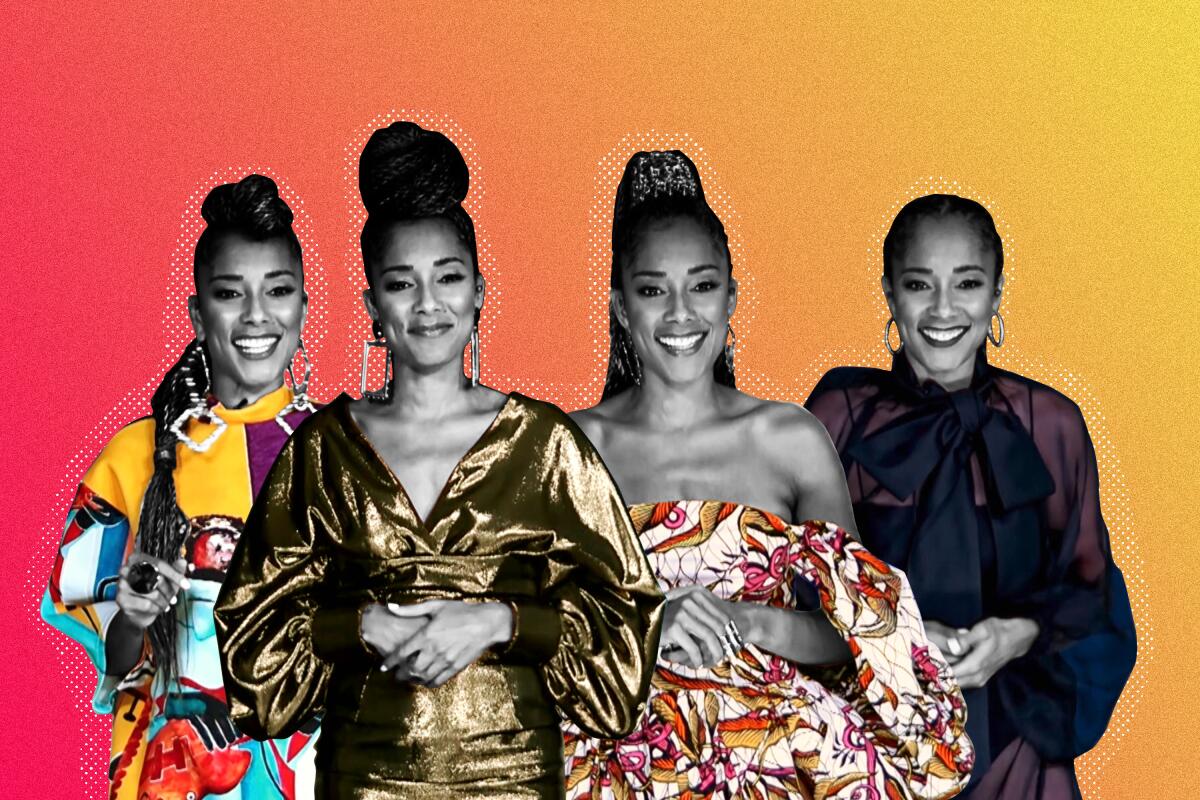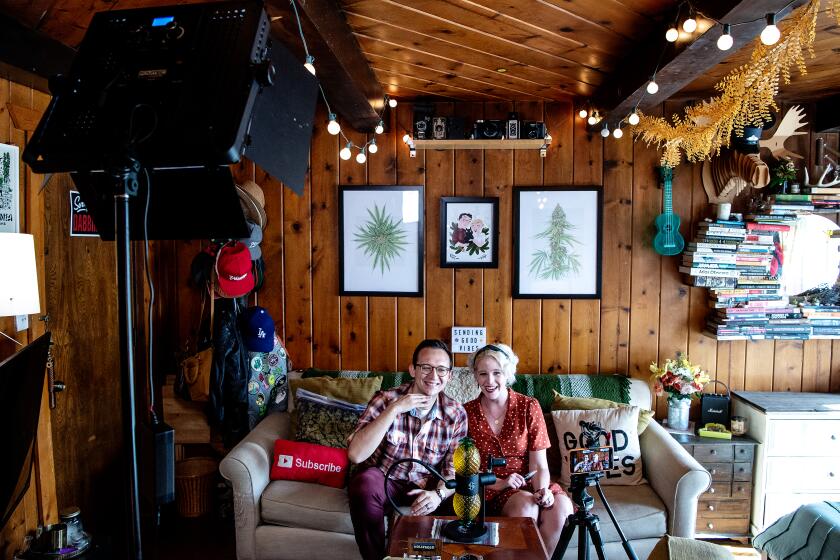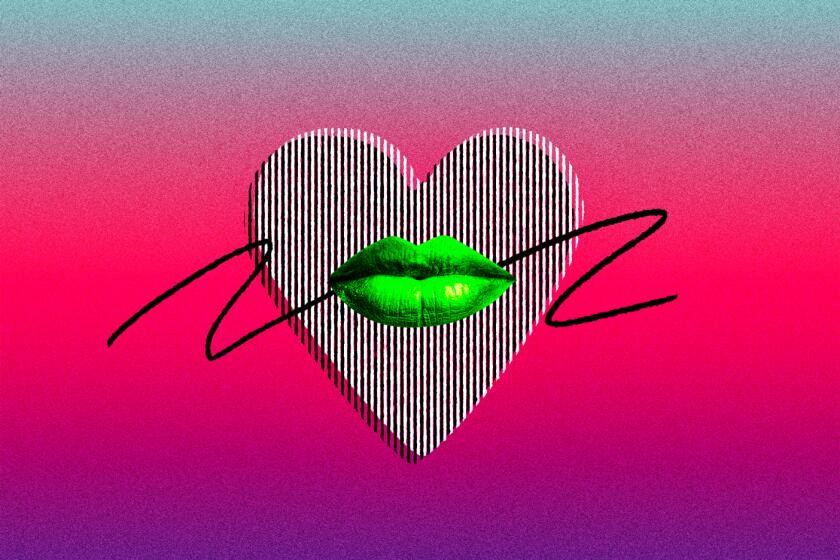How comedian and ‘Insecure’ star Amanda Seales used the pandemic to reset her life

While many actors were forced to stop working during the pandemic, Amanda Seales, the multi-hyphenated actress-comedian-writer-songwriter-rapper, has been going full steam ahead, taking on projects including expanding her production company, Smart Funny & Black Entertainment.
The charismatic Seales, whose comedy special “I Be Knowin’” premiered on HBO in 2019, has been busy with hosting her popular “Small Doses with Amanda Seales” podcast (based on her 2019 bestselling book, “Small Doses: Potent Truths for Everyday Use”) and developing the SFB Society community app and a new apparel line.
She also has been speaking out on social media. In addition to her co-starring role on HBO’s “Insecure,” Seales, host of NBC’s “Bring the Funny,” is a prolific social justice activist and uses her public platform to educate fans in a meaningful, nuanced manner.
On Instagram, Seales, a former cohost of Fox’s daytime talk show “The Real,” makes for a great BFF, giving tough-love relationship and work advice to her 1.7 million followers.
The 39-year-old actress and comedian has also managed to keep the punchlines and laughter coming thanks to her virtual comedy show. The Love Black Edition of Seales’ “Smart Funny & Black In Da Crib” show is scheduled for 6 to 8 p.m. Saturday. Tickets are available at smartfunnyandblack.com.
The Times had a spirited chat with Seales, who’s set to appear on truTV’s “Fast Foodies” next month, about her many passion projects that have become her main focus because of the pandemic. The conversation has been edited for clarity.You lived in the Valley until you were 8 years old. What were some of your favorite memories growing up here?
I said my first word in a Mexican restaurant, which is so L.A. My first word was “lights.” So bizarre to me. My mom said to me [that] I literally was sitting in the high chair, looked up and said, “Lights.” I guess it was: camera, action.
I lived across the street from Taco Bell. By the way, it pained me to find out there was a Taco Bell franchise owner who was a big Trump fan. I was like, “Wait, wait, wait — is this all Taco Bells?” Me and Taco Bell could do an endorsement. That’s how much I love them.
As a kid, I was surrounded by a lot of culture. There were Latino kids, Black girls, Armenian girls, white girls. That was very different than when I moved to Orlando. But in Los Angeles, I really had a diverse group of kids that I grew up with.
I found out later, from my first- and second-grade teachers, who were both Black women, they had decided amongst themselves to protect me. I had tested gifted in kindergarten. They made it their business to say like, “We need to make sure to put a little extra effort in to protect this mind.” These are the kind of Black children that get misdirected because their brilliance gets taken as insubordination. Or failure to have attentiveness. When really it’s like, “No, she’s just bored, inquisitive, etc.”
I found this all out later when I was having brunch with my first-grade teacher, and we were talking about my comedy special. I said to her, “It had taken me until 10th grade to learn the national anthem,” and she was like, “No, it didn’t. I taught you that in first grade.” I was like “What? I really didn’t know that.”You kept in touch all this time?
As fate would have it, in 2015, I went to an event. This woman was there, on a date with a friend of mine. We were all talking, and I noticed she wasn’t just an active listener. It was like she was trying to see through me. I was like, “Why is this chick looking at me like this? Like, I don’t want your man!” That was the energy I thought she was giving me.
She eventually was like, “Amanda!” And I was like, “Um, yes?” And she said again, “Amanda,” and put her face close to mine. And I realized, “Holy ..., this is Stephanie!” My mom had sent a picture of me and her from first grade two days earlier. And here this woman is standing in front of me. This was my first-grade teacher’s daughter. She was at the same school as me.
It was fascinating to see her. My best friend was her cousin. There was a whole lot of interconnectedness, that as a kid, I didn’t really truly understand.After getting your master’s in African American studies from Columbia University, you moved back to Los Angeles and have really done exceptionally well. Wouldn’t you agree?
I came out here and I was very quickly immersed into Hollywood, building my career. I have been very, very fortunate to see that happen in an abundant way. But I don’t care for Hollywood. I don’t care for this business nor the values that it’s based on.
This COVID has been — I am conflicted in saying — it’s been fortuitous for me, in positive ways. But it has been in that it really allowed me to have a reset in terms of the alignment of my career and values. And I was overdue for that. My last day-to-day job was [daytime talk show] “The Real,” and that really drained me in a number of ways. I knew that I needed to shift.
It was [as] if the universe had this massive shift for all of us. I think we have all been trying to adjust. I have been fortunate enough in that my stars were already aligned for that adjustment. So it hasn’t been as jarring for me as much as it has been peaceful.
Five years in, L.A.-based cannabis content creators Alice and Clark Campbell are just getting started.
Tell me about your production company.
I aspire to do this as independently as possible so that my content can be as Black, as consciously Black and funny, as possible, without having commerce and politics infringe upon the way the money is spent to make that content. I know for a lot of people, they’re like, “Well, that’s stupid.” Because [for them], it’s all about money. And for me, it just isn’t.
It’s all about my community, making artwork that is rooted in excellence and quality. If it means that I gotta take donations and work for other people to fund this kind of work, so be it.
I know that in the work that I am creating, I have to be at the helm. Because I am working from a place of integrity and ethics that capitalism and Hollywood do not adhere to.
During quarantine, you have been developing Illustrious League, a casualwear apparel line with your brand too, correct?
I have been doing merch for Smart, Funny & Black for years. I love fashion and clothes. My mom has always said, “You’re gonna be in fashion one day!” It took a minute to meet with the right company and right people that wanted to connect with my vision.
And so I am working with the production/distribution company, the CardboardBox Project, who are based out of Canada. They have just been really helping me in changing my mindset — from looking at things as just clothes that go along with the bigger project to actually saying, “No, the clothes are the project. These are the art.”
We will be having our limited-edition drops — each will be related to the work that I am doing, the things I say, my Instagram, my podcasts, my virtual shows, they all have unique nuance. So it’s like, here’s a way to create dope styles that come from dope art. There will also be unique items too. … It’s all synergistic and exciting.What is in each drop?
In each drop, there are apparel clothing items plus a unique specialty item. The truth of the matter is that I love nostalgia. I love novelty and tchotchkes. I am the person who goes to a concert and says, “Oh y’all got hats? Y’all got a deck of cards?” Like all these specialty things, I love that type of ... to remember the time.
So each of them is a moment in time that we want folks to remember. I want people to feel like, “Damn, I gotta get something from these drops, so I can be a part of the story that she is telling with them.”
Give yourself a little love, a gift and a big hug. You deserve them.
How many items are in each drop?
For the first drop, it’s small. We are giving you a few pieces. These are real mini capsules. The lesson I have had to learn the hard way is that you can’t skip steps. I think we are in an era where people just want to go from zero to 100. We are forgetting process. And that is what I am having to relearn in these quarantine times.Are you working with a stylist to create each look?
I am creating the clothes myself. Bryon Javar, who has styled me for the past four years including when I hosted the BET Awards, and I have been working closely. Not just on putting me in fly clothes, but really understanding what my unique style is. The expansion of that has given me the confidence to step into this space with my own stuff. Not only knowing my audience but also myself and what I want to wear. Being consistent with that in the branding.
Many folks mess up when they try to make stuff for everybody. All you can do is make stuff that is authentic. And that is what I am doing.
Living through the pandemic has changed us so much it seems. Do you agree?
This era, this time that we are in, is really about adjusting. For some of us that adjustment is having to come with a feeling of loss — loss of jobs, family members, plans. For a lot of us, this time is dealing with the arrival of truths, realities, breakthroughs. All those things are converging. I am in the middle of that myself.
Melba and Aubrey Provost are among L.A.’s most devoted cyclists. Ahead of Valentine’s Day, we spoke with the Provosts about their love of cycling, the city and each other.
Your hilarious comedy game show “Smart, Funny & Black” is now virtual. Tell me more about that.
We were going to do a three-day festival at the Kennedy Center until COVID hit. We had expanded this show, from 2016 to 2020, to a real venture that has consistently managed to use comedy to bring culture to community.
When this COVID thing happened, it was like, “Damn, this still serves a purpose. I still need to figure out how to continue to serve that purpose.” We managed to turn it into a virtual experience. We have done shows, calling it “Smart, Funny & Black In the Crib.” It’s been a worldwide communicative experience.
Typically we have been in people’s cities, limited to those people there. Well now, being in people’s homes virtually, we have viewers watching from Dubai, India, Ireland, South Africa, London, Jamaica. It’s really been great to see that even in these trying times, we have been able to use the show to bring folks together, not just in America but worldwide, around celebrating Black culture.
More to Read
Sign up for The Wild
We’ll help you find the best places to hike, bike and run, as well as the perfect silent spots for meditation and yoga.
You may occasionally receive promotional content from the Los Angeles Times.












